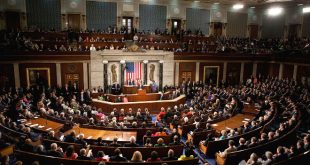 The first question asked of the presidential candidates at the most recent Republican debate, hosted by CNN in Miami on March 10, was “whether trade deals have been good for the American workers.” Moderator Jake Tapper observed that one of Donald Trump’s “signature issues” has been his criticism of “disastrous trade deals” that have destroyed many good middle-class jobs that existed a generation ago.
The first question asked of the presidential candidates at the most recent Republican debate, hosted by CNN in Miami on March 10, was “whether trade deals have been good for the American workers.” Moderator Jake Tapper observed that one of Donald Trump’s “signature issues” has been his criticism of “disastrous trade deals” that have destroyed many good middle-class jobs that existed a generation ago.
The other three GOP candidates have supported trade deals in the past and still support them in principle, even while acknowledging the voters’ concerns about the harmful effects of such agreements. Two of the candidates even advocate the 12-nation Trans-Pacific Partnership, which President Obama wants Congress to ratify before he leaves office.
Ohio Governor John Kasich likes to remind everyone that he “grew up in a blue collar family,” but votes he cast during his 18 years in Congress helped to decimate the manufacturing base of his home state. Kasich voted for the North American Free Trade Agreement in 1994, and in 2000 he voted to grant the “normal” trading privileges, which allowed China to enter the World Trade Organization.
Florida Senator Marco Rubio twice voted in favor of giving President Obama the authority to negotiate trade agreements, including the Trans-Pacific Partnership. He insisted that trade deals provide “access to foreign markets” (even though most of the world’s people can’t afford to buy anything made in America) and he offered sentimental happy-talk that American workers “can compete against anyone in the world” despite 20 years of trade deficits proving otherwise.
Senator Ted Cruz once voted in favor of presidential trade authority before reversing himself on the subsequent vote last year. Cruz now says he opposes the TPP, but Congress has never rejected a trade deal after giving the president the authority to negotiate it.
“I am different in one primary respect, and that’s trade,” Trump insisted in the debate, explaining that “trade deals are absolutely killing our country.” He has proposed tariffs to offset abusive practices such as currency devaluation by “certain countries that are taking advantage of the United States and laughing at our stupidity.”
In response to Trump’s suggestion that we threaten to tax imports from countries that do not trade fairly with us, Ted Cruz warned that Americans would be forced to pay higher prices for Chinese-made goods at Walmart. “Honestly, it’s just the opposite,” Trump retorted, because “we will start building those factories and those plants,” and “people will buy products from here, rather than buying it through China where we’re being ripped off.”
A new study by the non-partisan National Bureau of Economic Research provides support for Trump’s criticism of free trade with China. This new report, entitled “The China Shock,” shows how trade with China has resulted in higher unemployment and lower wages in communities across our country.
Last year, imports from China rose to a new record high of $481.9 billion, while the Chinese purchased less than a quarter of that amount from the United States. The nearly $500 billion we sent to China last year could have supported millions of good jobs for Americans, but instead, some of it ends up financing the Chinese military to point its missiles at California.
According to the 200-year-old theory of free trade, workers who lose manufacturing jobs to China should be able to find new jobs in other industries that benefit from a trade surplus, such as the pharmaceutical industry, or in non-tradable industries such as medicine and legal services. But millions of these workers, many of whom are men struggling to support their families, have not found adequate replacement jobs.
Some settle for lower-paying jobs, while others give up entirely, creating a social issue as well as an economic one. The percentage of men between 25 and 54 years old who are not employed has tripled in the last half century, and many who had been working at $40 per hour manufacturing jobs are now receiving only $10 per hour jobs at Walmart or fast-food joints.
Michigan, where the original “Reagan Democrats” were identified as a voter group, shattered its 40-year record for turnout in a presidential primary this year, and some precincts even ran out of ballots. Trump walked away with a double-digit victory over his nearest Republican rival, while Hillary Clinton was humiliated by an upset defeat by Senator Bernie Sanders, a critic of free trade.
In the general election in November, there will be millions of voters ready to cast their ballots for a candidate who stands up for American workers rather than catering to lobbyists who seek free-trade deals. CNN documented 45 times that Clinton pushed for the disastrous Trans-Pacific Partnership, which the leading Republican candidate opposes.
COPYRIGHT 2016 CREATORS.COM
Photo credit: By Gobierno de Chile – 14.11.2010 Gira a Asia, CC BY 2.0, https://commons.wikimedia.org/w/index.php?curid=12400672
 Phyllis Schlafly is a lawyer, conservative political analyst and author of 20 books. She is the co-author, with George Neumayr, of the New York Times Best-Seller titled “No Higher Power: Obama’s War on Religious Freedom.” She can be contacted by e-mail at phyllis@eagleforum.org.
Phyllis Schlafly is a lawyer, conservative political analyst and author of 20 books. She is the co-author, with George Neumayr, of the New York Times Best-Seller titled “No Higher Power: Obama’s War on Religious Freedom.” She can be contacted by e-mail at phyllis@eagleforum.org.
The views expressed in opinion articles are solely those of the author and are not necessarily either shared or endorsed by Black Community News.
 CURE News and Clergy Blog News and Commentary for Christians
CURE News and Clergy Blog News and Commentary for Christians



